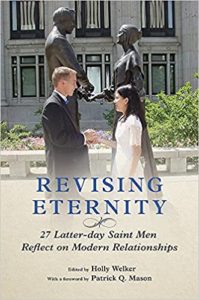
Title:
Revising Eternity: 27 Latter-day Saint Men Reflect on Modern Relationships
Editor: Holly Welker
Publisher: University of Illinois Press
Genre: LDS gender studies
Year Published: 2022
Number of Pages: 272
Binding: Quality Paperback
Reviewed by Rachel Helps
The cover art is deceiving–this book would not be at home in Deseret Book. It has supplied me with a plethora of existential horrors I had not yet conceived: hetero couples marrying and living in misery due to one of them being gay, past abuse, current abuse, drug addiction, masturbation, a narcissistic desire for polygamy, etc. The many stories of unhappy marriages made me hold my husband a little closer at night.
The first third of the essays are more lighthearted, but still deal with masculine topics like getting a vasectomy and experiencing sexual impotence. Being a woman, I’ve had zero experience really thinking about these kinds of things. I was able to excuse the uneven quality of the writing for the sheer novelty of having insight into the domestic lives of men. I’ve read so much on domesticity from a woman’s perspective through blogs, memoirs, and personal essays. But I think this was the first time I had read how various Mormon and Mormon-adjacent men feel about it. I appreciated Joey Franklin’s candid view on “helping” with childcare and housework:
I’m restless for some kind of middle ground where every dish I wash and diaper I change doesn’t turn into an apology for being male, where I can buy Melissa flowers and rub her feet without feeling as if I’m merely rebalancing the scales or, worse, buttering her up. I want a reality where we both can pursue our own interests and careers and the kids still get everything they need. Where developing my own sense of identity doesn’t preclude Melissa from developing hers. I don’t think Linda should feel guilty when she leaves in the morning, and neither should I. But the reality seems to be that if someone is going to stay home with the children, there is no middle ground.
Another aspect of the collection that I really enjoyed was the diversity of experiences with the LDS Church. Many of the authors did not consider themselves active members and often gave reasons for not being part of the church. Sometimes as a member of the LDS Church, it’s easy for me to dismiss the people who aren’t there because they have no voice in our discussions. These essays helped me to see their legitimate reasons for leaving the faith tradition. There were also several instances where church teachings made a person’s suffering worse. I don’t often hear about those from men, and I would prefer to know about them than to ignore them.
 Title: Revising Eternity: 27 Latter-day Saint Men Reflect on Modern Relationships
Title: Revising Eternity: 27 Latter-day Saint Men Reflect on Modern Relationships
Kjerste from the BYU library reports, “We had to request a new number for it from the Library of Congress because it didn’t fit well into any of the preexisting ones!”